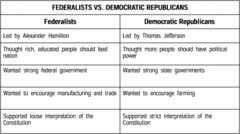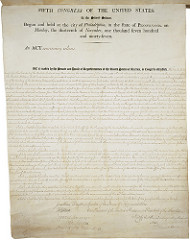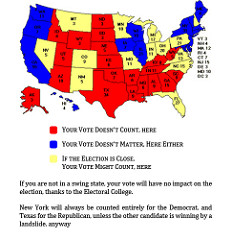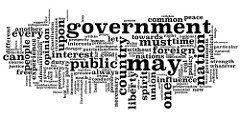protective tariff
a tax on higher goods that raises the price of foreign goods, a tax on imported goods that raises the price of imports so people will buy domestic goods
political parties
group that organize to help elect government officials
federalist party
the party of Alexander Hamilton
democratic-republican party
the party of Thomas Jefferson
bonds
certificates that represented money owed
Jay's Treaty
was the treaty signed by John Jay that solved differences between the U.S. and Great Britain
speculators
bought bonds at a discounted price. Favored by Hamilton.
precedent
any decisions that Washington made for the first time determined how the country would be run for years to come.
12 Amendment
created a separate ballot for President and Vice-President
Pinckney's Treaty
Spain and the US agreed to a new border for Florida and the Port of New Orleans was opened.
Whiskey Rebellion
In 1794, farmers in Pennsylvania rebelled against Hamilton's excise tax on whiskey, and several federal officers were killed in the riots caused by their attempts to serve arrest warrants on the offenders. In October, 1794, the army, led by Washington, put down the rebellion. The incident showed that the new government under the Constitution could react swiftly and effectively to such a problem, in contrast to the inability of the government under the Articles of Confederation to deal with Shay's Rebellion.
French Revolution
began in 1789 with some nonviolent restrictions on the king, but became more hostile in 1792 when France declared war on Austria. Seeking help from America, the French pointed to the Franco-American alliance of 1778. Not wanting to get involved for fear of damage to the trade business, Washington gave the Neutrality Proclamation, which made America neutral. This led to arguments between Americans and French. After fighting with the French over such things as the Jay Treaty, the Americans came to peace with France in 1800.
Alexander Hamilton
1789-1795; First Secretary of the Treasury. He advocated creation of a national bank, assumption of state debts by the federal government, and a tariff system to pay off the national debt.
Thomas Jefferson
A prominent statesman, Thomas Jefferson became George Washington's first secretary of state. Along with James Madison, Jefferson took up the cause of strict constructionists and the Republican Party, advocating limited federal government. As the nation's third president from 1801 to 1809, Jefferson organized the national government by Thomas Jefferson Republican ideals, doubled the size of the nation, and struggled to maintain American neutrality
john adams
He was the second president of the United States and a Federalist. He was responsible for passing the Alien and Sedition Acts. Prevented all out war with France after the XYZ Affair. His passing of the Alien and Sedition Acts severely hurt the popularity of the Federalist party and himself
George Washington
American commander-in-chief; first president, set precedents for future presidents, put down Whiskey Rebellion (enforced Whiskey Tax), managed first presidential cabinet, carefully used power of executive to avoid monarchial style rule
XYZ Affair
An insult to the American delegation when they were supposed to be meeting French foreign minister, Talleyrand, but instead they were sent 3 officials Adams called "X,Y, and Z" that demanded $250,000 as a bribe to see Talleyrand.
alien and sedition acts
acts passed by federalists giving the government power to imprison or deport foreign citizens and prosecute critics of the government
electoral college
a group of people named by each state legislature to select the president and vice president
Washington's Farewell address
Referred to as Washington's Farewell Address. Its main points included:Not creating political parties, developing its own trade, and not entering into permanent alliances with foreign nations, especially with Europe.
The National Bank
Proposed by Hamilton to control the distribution of currency in the United States. It would store the tax funds collected by Congress and make loans to the states and private businesses. Congress approved its creation using the elastic clause in 1791.
Proclamation of Neutrality
A formal announcement issued by President George Washington on April 22, 1793, declaring the United States a neutral nation in the conflict between Great Britain and France.
alien act
Allowed the President to remove any foreigner from the country who was thought to be dangerous. Immigrants had to live in America 14 years before being able to vote. Most immigrants were Democratic Republicans, so this kept them from voting for a long time.
sedition act
made it a crime to write, print, utter, or publish criticism of the president of government
National debt
the amount of money a national government owes to other governments or its people
election of 1800
Tie between Aaron Burr and Thomas Jefferson which went to the House of Representatives. Jefferson won the presidency after 36 ballots when Alexander Hamilton persuaded three members of the House to vote for Jefferson. Significance: 12 amendment
election of 1796
The first real contested presidential election. Federalists support John Adams, Republicans support Thomas Jefferson. Adams wins, Jefferson becomes V.P.
















